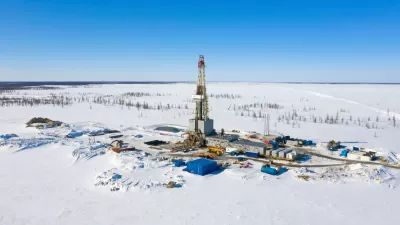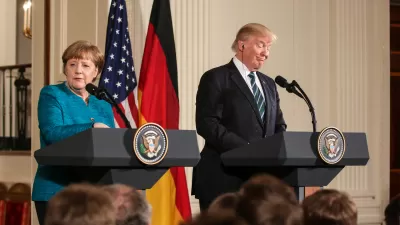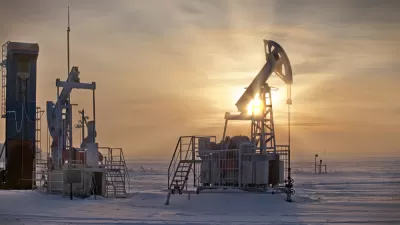German Chancellor Angela Merkel is trying to salvage a plan to increase the country's reliance on renewable energy to at least 35 percent by 2020 amid rising energy prices and mounting criticism
Melissa Eddy reports on Merkel's efforts to develop a nationwide strategy on renewable energy in order to salvage what was once a widely supported plan for energy transformation passed last year in the wake of the Fukushima nuclear disaster in Japan.
"Until now," writes Eddy, "each state has drawn up and worked from its own plan for the
expansion of renewable resources in its territory, often in conflict
with one another. On the federal side, there is no single leader for the
project to increase reliance on renewable energy to at least 35 percent
by 2020. Instead, responsibilities are divided between the ministries
of the environment and the economy, with the education minister
responsible for financing research on renewable energy and storage
technology."
"The opposition Social Democratic Party has pounced on the weakness in
the Merkel government's signature project ahead of national elections
next year, while widespread public support for the plan faces strains
from a nearly 50 percent jump in a consumer tax for the transformation
next year."
Meanwhile, according to Stanley Reed, Europe in general, and Germany in particular, are seeing a contradictory rise in the use of coal and the construction of coal-fired power plants.
"A kind of economic chain reaction is making coal attractive in Europe," writes Reed.
"U.S. utilities are shutting down their coal-fired plants and switching
to
because the shale gas revolution has made the cleaner-burning fuel
cheaper. U.S. coal producers are then exporting their product to Europe,
helping to lower prices there."
"Utilities will soon need to pay a carbon price for coal, but at the
moment that price in the European program for carbon trading - about €8
per ton of carbon emissions - is far too low to affect their decisions."
"What is going on is a shift from nuclear power to coal and from gas to coal; this is the worst thing you could do, from a perspective," said Dieter Helm, a professor of energy policy at the University of Oxford.
FULL STORY: Germany Discusses National Energy Plan

Alabama: Trump Terminates Settlements for Black Communities Harmed By Raw Sewage
Trump deemed the landmark civil rights agreement “illegal DEI and environmental justice policy.”

Planetizen Federal Action Tracker
A weekly monitor of how Trump’s orders and actions are impacting planners and planning in America.

The 120 Year Old Tiny Home Villages That Sheltered San Francisco’s Earthquake Refugees
More than a century ago, San Francisco mobilized to house thousands of residents displaced by the 1906 earthquake. Could their strategy offer a model for the present?

Ken Jennings Launches Transit Web Series
The Jeopardy champ wants you to ride public transit.

BLM To Rescind Public Lands Rule
The change will downgrade conservation, once again putting federal land at risk for mining and other extractive uses.

Indy Neighborhood Group Builds Temporary Multi-Use Path
Community members, aided in part by funding from the city, repurposed a vehicle lane to create a protected bike and pedestrian path for the summer season.
Urban Design for Planners 1: Software Tools
This six-course series explores essential urban design concepts using open source software and equips planners with the tools they need to participate fully in the urban design process.
Planning for Universal Design
Learn the tools for implementing Universal Design in planning regulations.
Clanton & Associates, Inc.
Jessamine County Fiscal Court
Institute for Housing and Urban Development Studies (IHS)
City of Grandview
Harvard GSD Executive Education
Toledo-Lucas County Plan Commissions
Salt Lake City
NYU Wagner Graduate School of Public Service





























